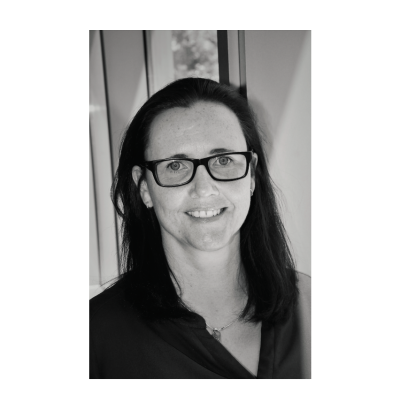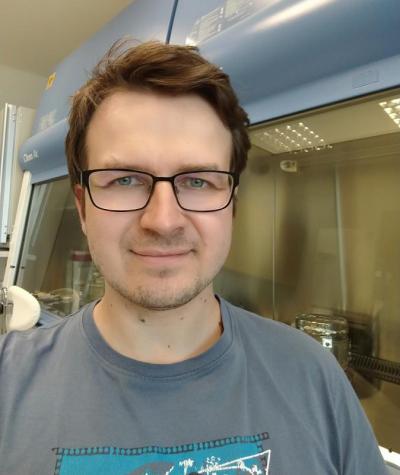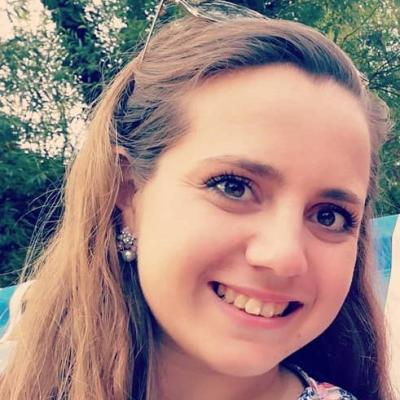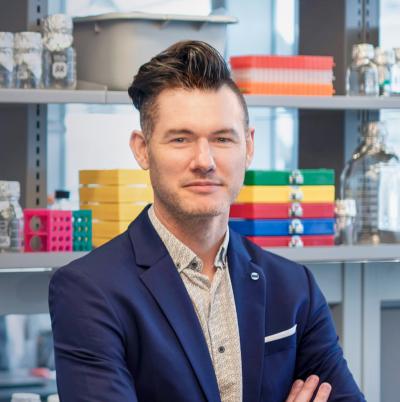The field of regenerative medicine holds the promise of engineering damaged or diseased tissues previously thought to be irreparable. Some approaches involve the use of stem cells, progenitor cells, and novel materials.
The NEI Office of Regenerative Medicine (ORM) hosts a webinar series, called the Vision Innovation Seminars, to promote and disseminate cutting-edge research that is relevant to the vision community. Authors of recently published articles will present their work to the research community through this webinar series. The seminar series is recorded and can be made available upon request. If you require any other services, please contact the NEI Office of Regenerative Medicine at neiorm@nei.nih.gov at least 24 hours prior to an event.
Previous Vision Innovation Seminars
Dr. Heike Kroeger: ATF6 is essential for human cone photoreceptor development

Dr. Heike Kroeger: “ATF6 is essential for human cone photoreceptor development”
Recent Publication: ATF6 is essential for human cone photoreceptor developmentDr. Heike Kroeger received an undergraduate degree in Biochemistry from Free University Berlin in Germany and earned her PhD in Structural Medicine and Cell Biology at Cambridge University, UK. She is currently an Assistant Research Scientist at the University of Georgia in the Cellular Biology Department. Her current research is focused on a UGA collaboration to establish a new approach of corneal organoid generation for a new strategy of future clinical therapies, such as aniridia. Dr. Kroeger is independently investigating the contribution of cell stress modulators during eye development and retinal disease pathologies. In support of her independent research, she received the 2021 Knights Templar Eye Foundation, Inc. career starter grant.
Additional reading relevant to talk:
Dr. Bo Chen: Protection of retinal ganglion cells for vision preservation

Dr. Bo Chen: “Protection of retinal ganglion cells for vision preservation”
Recent Publication: Preservation of vision after CaMKII-mediated protection of retinal ganglion cells
Dr. Bo Chen received his PhD in Pharmacology at the University of Miami School of Medicine, and later pursued postdoctoral training in the Department of Genetics at Harvard University. He was previously an assistant and associate professor in the Departments of Ophthalmology and Neuroscience at Yale University School of Medicine, and is currently an associate professor in the Departments of Ophthalmology and Neuroscience at the Icahn School of Medicine at Mount Sinai. He received the Karl Kirchgessner Foundation Award for Retinal Research and was a Pew Scholar in the Biomedical Sciences from 2013-2018. He is a reviewer for numerous publications including, but not limited, to Science, Neuron, eLife, PNAS, and Journal of Neuroscience.
Dr. Bo Chen’s research focuses on mechanistic and therapeutic studies of retinal degenerative diseases caused by loss of photoreceptors or retinal ganglion cells, such as age-related macular degeneration, retinitis pigmentosa, and glaucoma. To study these conditions, his laboratory pursues two main strategies: neuroprotective strategy to save existing retinal neurons and neural regenerative strategy to produce new retinal neurons.
Additional reading relevant to talk:
- Restoration of vision after de novo genesis of rod photoreceptors in mammalian retinas
- Wnt regulates proliferation and neurogenic potential of Müller glial cells through a Lin28/let-7 miRNA-dependent pathway in adult mammalian retina
- GSK3β regulates AKT-induced CNS axon regeneration through an eIF2Bε-dependent, mTOR-independent signaling pathway
- A short N-terminal domain of HDAC4 preserves photoreceptors and restores visual function in retinitis pigmentosa
Mr. Jan Kössl: Anti-inflammatory and therapeutic effects of mesenchymal stem cells in the treatment of damaged ocular surface and retina in animal models

Mr. Jan Kössl: Anti-inflammatory and therapeutic effects of mesenchymal stem cells in the treatment of damaged ocular surface and retina in animal models
Recent Publication: Antiapoptotic Properties of Mesenchymal Stem Cells in a Mouse Model of Corneal Inflammation
Mr. Jan Kössl is a PhD student of Immunology in the Faculty of Science, Charles University in Prague and he works at the Institute of Experimental Medicine of the Czech Academy of Sciences under the supervision of Prof. Dr. Vladimir Holan. His thesis focuses on anti-inflammatory and therapeutic effects of stem cells in the treatment of damaged ocular surface and retina in in vivo and in vitro animal models.
Additional reading relevant to talk:
- Antiapoptotic Properties of Mesenchymal Stem Cells in a Mouse Model of Corneal Inflammation
- A Comparative Study of the Therapeutic Potential of Mesenchymal Stem Cells and Limbal Epithelial Stem Cells for Ocular Surface Reconstruction
- The Immunomodulatory Potential of Mesenchymal Stem Cells in a Retinal Inflammatory Environment
- Recent Advances in Stem Cell Therapy for Limbal Stem Cell Deficiency: A Narrative Review
Mr. Giovanni Pasquini & Ms. Virginia Cora : Transcriptomic assessing and guiding DSB repair pathway in relevant retinal models: an insight on retinal organoids

Mr. Giovanni Pasquini & Ms. Virginia Cora: Transcriptomic assessing and guiding DSB repair pathway in relevant retinal models: an insight on retinal organoids
Recent Publication: Using Transcriptomic Analysis to Assess Double-Strand Break Repair Activity: Towards Precise in Vivo Genome Editing
Mr. Giovanni Pasquini is a PhD student in the Dresden International Graduate School for Biomedicine and Bioengineering (DIGS-BB). His thesis work is focused on inferring and modulating Double Strand Break pathways activity by the study of transcriptomic data to guide in vivo Genome Editing approaches. His doctoral research is conducted at the Center for Regenerative Therapies of Dresden under the supervision of Prof. Dr. Volker Busskamp.
Ms. Virginia Cora is a doctoral student in the Eberhard Karls University of Tübingen. Since 2018, she is part of the team of the Institute for Neuroanatomy and Developmental Biology (INDB) under the supervision of Prof. Dr. Stefan Liebau.
Ms. Cora's work is focused on unravelling the effects of a mutation located in the gene Crumbs Homolog 1 (CRB1) that is associated with the insurgence of Retinitis Pigmentosa. For her investigations she is utilizing induced pluripotent stem cells (iPSCs)-derived retinal organoids as a model system.
Additional reading relevant to talk:
Dr. Elisa Cuevas: Retinal organoids lacking NRL are rich in blue cone cells at expense of rod photoreceptors

Dr. Cuevas is a molecular biologist with over thirteen years of research experience acquired in Madrid, Berlin and London. During her PhD, she developed a conditional mouse model to study cilia-linked centrosomal genes. She is an expert in stem cells, gene editing and gene replacement molecular research. Dr. Cuevas has used her expertise to investigate innovative brain development and retina regeneration treatments to restore sight.
Additional reading relevant to talk:
- NRL−/− gene edited human embryonic stem cells generate rod‐deficient retinal organoids enriched in S‐cone‐like photoreceptors (wiley.com)
- Restoring Vision Using Stem Cells and Transplantation - PubMed (nih.gov)
- Isolation and Comparative Transcriptome Analysis of Human Fetal and iPSC-Derived Cone Photoreceptor Cells - PubMed (nih.gov)
- Daylight vision repair by cell transplantation - PubMed (nih.gov)
- Recessive NRL mutations in patients with clumped pigmentary retinal degeneration and relative preservation of blue cone function - PubMed (nih.gov)
Dr. Veselina Petrova: Making injured axons "protrude" again: Protrudin functions from the endoplasmic reticulum to support axon regeneration after optic nerve injury

Dr. Veselina Petrova completed her PhD in Clinical Neurosciences as a Gates Scholar at the University of Cambridge, UK, where she worked on understanding the mechanisms behind successful axon regeneration and designing strategies to boost this process in non-regenerative systems. Veselina is currently a research fellow at Boston Children's Hospital and Harvard University where she studies chemotherapy-induced peripheral neuropathy and the crosstalk between degenerative and regenerative events in the neuron.
Additional reading relevant to talk:
Dr. Patrick Yu-Wai-Man: Leber Hereditary Optic Neuropathy – from Bedside to Bench (and Back)

Dr Patrick Yu-Wai-Man is an academic neuro-ophthalmologist with a major research interest in mitochondrial genetics and inherited eye diseases. His research programme is currently focused on dissecting the disease mechanisms leading to progressive retinal ganglion cell loss in inherited optic neuropathies by using a combination of patient tissues, induced pluripotent stem cells and animal models. Dr Yu-Wai-Man leads the Clinical Vision Lab that was set up as a cross-cutting facility to support advanced therapeutics within the Cambridge Biomedical Campus. In parallel, he is actively collaborating with an international network of academic and industrial partners in an effort to fast track the development of effective therapies for inherited optic neuropathies, including novel gene therapy approaches. In addition to his academic roles, Dr Yu-Wai-Man contributes to the clinical service of patients with mitochondrial disease at Addenbrooke’s Hospital (Cambridge) and he runs a dedicated optic nerve genetics clinic at Moorfields Eye Hospital (London).
Additional reading relevant to talk:
- A neurodegenerative perspective on mitochondrial optic neuropathies
- Treatment strategies for Leber hereditary optic neuropathy
- Bilateral visual improvement with unilateral gene therapy injection for Leber hereditary optic neuropathy
- Efficacy and Safety of Intravitreal Gene Therapy for Leber Hereditary Optic Neuropathy Treated within 6 Months of Disease Onset
Dr. Levi Todd: The role of microglia in retinal regeneration

Dr. Levi Todd obtained his PhD in Neuroscience at The Ohio State University, where he worked with Dr. Andy Fischer. His work centered on uncovering the cell-signaling networks that control the neural regenerative capacity of Muller glia. Levi is currently a postdoctoral fellow in Thomas Reh’s lab at the University of Washington, where he is continuing to study retinal regeneration with a focus on the neuroimmune system.
Additional reading relevant to talk:
- Microglia Suppress Ascl1-Induced Retinal Regeneration in Mice
- STAT Signaling Modifies Ascl1 Chromatin Binding and Limits Neural Regeneration from Muller Glia in Adult Mouse Retina
- Stimulation of functional neuronal regeneration from Müller glia in adult mice
- Reactive microglia and macrophage facilitate the formation of Müller glia-derived retinal progenitors
Dr. Nikolaos Mitrousis - Retinal degeneration: bioengineering to the rescue

Dr. Mitrousis completed his PhD in Biomedical Engineering at the University of Toronto, under the supervision of Prof. Molly Shoichet. His work focused on developing bioengineering tools for studying and treating retinal degeneration, employing biomaterials and stem/progenitor cells. Nick is currently a postdoctoral fellow at the University of Chicago, in the labs of Prof. Melody Swartz and Prof. Jeffrey Hubbell, focusing on modulating immune responses.
Additional reading relevant to talk:
- Hydrogel-mediated co-transplantation of retinal pigmented epithelium and photoreceptors restores vision in an animal model of advanced retinal degeneration
- Hyaluronic Acid‐Based Hydrogels Enable Rod Photoreceptor Survival and Maturation In Vitro through Activation of the mTOR Pathway
- Hydrogel for Simultaneous Tunable Growth Factor Delivery and Enhanced Viability of Encapsulated Cells in Vitro
Background Review:
Dr. Shane Liddelow: Neurotoxic Reactive Astrocytes Drive Neuronal Death after Retinal Injury

Dr. Liddelow gained his PhD with Katarzyna Dziegielewska and Norman Saunders in Pharmacology from the University of Melbourne. His graduate work focused on the protective barriers of the brain during early development. As a postdoctoral fellow in the lab of Ben Barres at Stanford University, he discovered a close association between astrocytes, microglia (the resident immune cells of the brain), and abnormal neuron function. He showed that one form of reactive astrocyte is induced by factors released by microglia. These reactive astrocytes release a toxic factor that kills specific subtypes of neurons and are present in brains of patients with several neurodegenerative diseases. In 2018, he started his own research group at NYU School of Medicine in New York City.
Additional reading relevant to talk:
Dr. Christopher McTiernan & Ms. Fiona Simpson: LiQD Cornea: Pro-regeneration collagen mimetics as patches and alternatives to corneal transplantation

Dr. Chris McTiernan obtained his Ph.D. in Chemistry at the University of Ottawa and trained as a postdoctoral fellow in May Griffith’s laboratory, Department of Ophthalmology, University of Montreal, and Maisonneuve-Rosemont Hospital, where he developed the current LiQD Cornea formulation. He continues to work in translational regenerative medicine, developing collagen mimetic materials for use in soft tissue repair, as a postdoctoral researcher at the University of Ottawa Heart Institute.
Ms. Fiona Simpson is a PhD student in the University of Montreal Biomedical Engineering program. Her thesis focuses on the use of extracellular vesicles and exosomes as biomarkers for regenerative medicine applications. She conducts her doctoral research at the Maisonneuve-Rosemont Hospital Research Centre, under the supervision of Dr. May Griffith and Dr. Marie-Claude Robert.
Additional reading relevant to talk:
- LiQD Cornea: Pro-regeneration collagen mimetics as patches and alternatives to corneal transplantation
- Collagen-Based Fillers as Alternatives to Cyanoacrylate Glue for the Sealing of Large Corneal Perforations
- Short peptide analogs as alternatives to collagen in pro-regenerative corneal implants
- Self-assembled collagen-like-peptide implants as alternatives to human donor corneal transplantation
Dr. Divya Sinha: Mutation dependent gene therapy strategies for a genotypically diverse dominant maculopathy

Dr. Divya Sinha completed her PhD in the lab of Dr. Michael Shogren-Knaak at Iowa State University. As a postdoctoral researcher in Dr. David Gamm’s lab, her training involved human pluripotent stem cell-based disease modeling and its applications for retinal degenerative disorders. Currently, she is a scientist in the Gamm lab at University of Wisconsin-Madison.
Additional reading relevant to talk:
- Human iPSC modeling reveals mutation-specific responses to gene therapy in genotypically diverse dominant maculopathy
- Bestrophinopathy: An RPE-photoreceptor interface disease
- Structure and insights into the function of Ca2+-activated Cl- channel
- iPS cell modeling of Best disease: insights into the pathophysiology of an inherited macular degeneration
Dr. Brian Clark: Retinal development at single-cell resolution

Dr. Clark received his training within the labs of Dr. Brian Link (PhD; Medical College of Wisconsin) and Dr. Seth Blackshaw (Post-doc; Johns Hopkins University School of Medicine), focusing on understanding the cellular features and transcriptional networks governing retinal neurogenesis and cell fate specification. Dr. Clark recently established his independent lab at Washington University School of Medicine (St. Louis) in the John F Hardesty, MD Department of Ophthalmology and Visual Sciences.
Additional reading relevant to talk:
- Single-Cell Analysis of Human Retina Identifies Evolutionarily Conserved and Species-Specific Mechanisms Controlling Development
- Single-Cell RNA-Seq Analysis of Retinal Development Identifies NFI Factors as Regulating Mitotic Exit and Late-Born Cell Specification
- Decomposing Cell Identity for Transfer Learning Across Cellular Measurements, Platforms, Tissues, and Species
Dr. Sandra Petrus-Reurer: Human Embryonic Stem Cells to Treat Retinal Degeneration & how to Escape the Immune System

Dr. Petrus-Reurer carried out her doctoral studies Karolinska Institute of Sweden with a focus on the use of human embryonic stem cells for retinal repair in patients with age-related macular degeneration. Dr. Petrus-Reurer is currently a postdoctoral researcher at Cambridge University as a part of the Saeb-Parsy Lab.
Additional reading relevant to talk:
- In Vivo Imaging of Subretinal Bleb-Induced Outer Retinal Degeneration in the Rabbit
- Xeno-Free and Defined Human Embryonic Stem Cell-Derived Retinal Pigment Epithelial Cells Functionally Integrate in a Large-Eyed Preclinical Model
- Integration of Subretinal Suspension Transplants of Human Embryonic Stem Cell-Derived Retinal Pigment Epithelial Cells in a Large-Eyed Model of Geographic Atrophy
- Subretinal Transplantation of Human Embryonic Stem Cell Derived-retinal Pigment Epithelial Cells into a Large-eyed Model of Geographic Atrophy
- Generation of Retinal Pigment Epithelial Cells Derived from Human Embryonic Stem Cells Lacking Human Leukocyte Antigen Class I and II
- Identification of cell surface markers and establishment of monolayer differentiation to retinal pigment epithelial cells
- Preclinical safety studies of human embryonic stem cell‐derived retinal pigment epithelial cells for the treatment of age‐related macular degeneration
Dr. Tea Soon Park: Vascular Progenitor Cells Generated from Human Naïve Diabetic iPSC for Revascularization of Ischemic Retina

Dr. Park obtained her Ph.D. in Bioengineering at the University of Pittsburg and was trained as a postdoctoral fellow in the department of Pediatric Oncology and Institute for Cell Engineering at the Johns Hopkins University. Dr. Park is currently a key member of Dr. Kapil Bharti’s laboratory in the Ophthalmic Genetics and Visual Function Branch (OGVFB) at NEI.
Additional reading relevant to talk:
- Vascular progenitors generated from tankyrase inhibitor-regulated naïve diabetic human iPSC potentiate efficient revascularization of ischemic retina
- Vascular Progenitors From Cord Blood-Derived Induced Pluripotent Stem Cells Possess Augmented Capacity for Regenerating Ischemic Retinal Vasculature
- Tankyrase Inhibition Promotes a Stable Human Naïve Pluripotent State With Improved Functionality